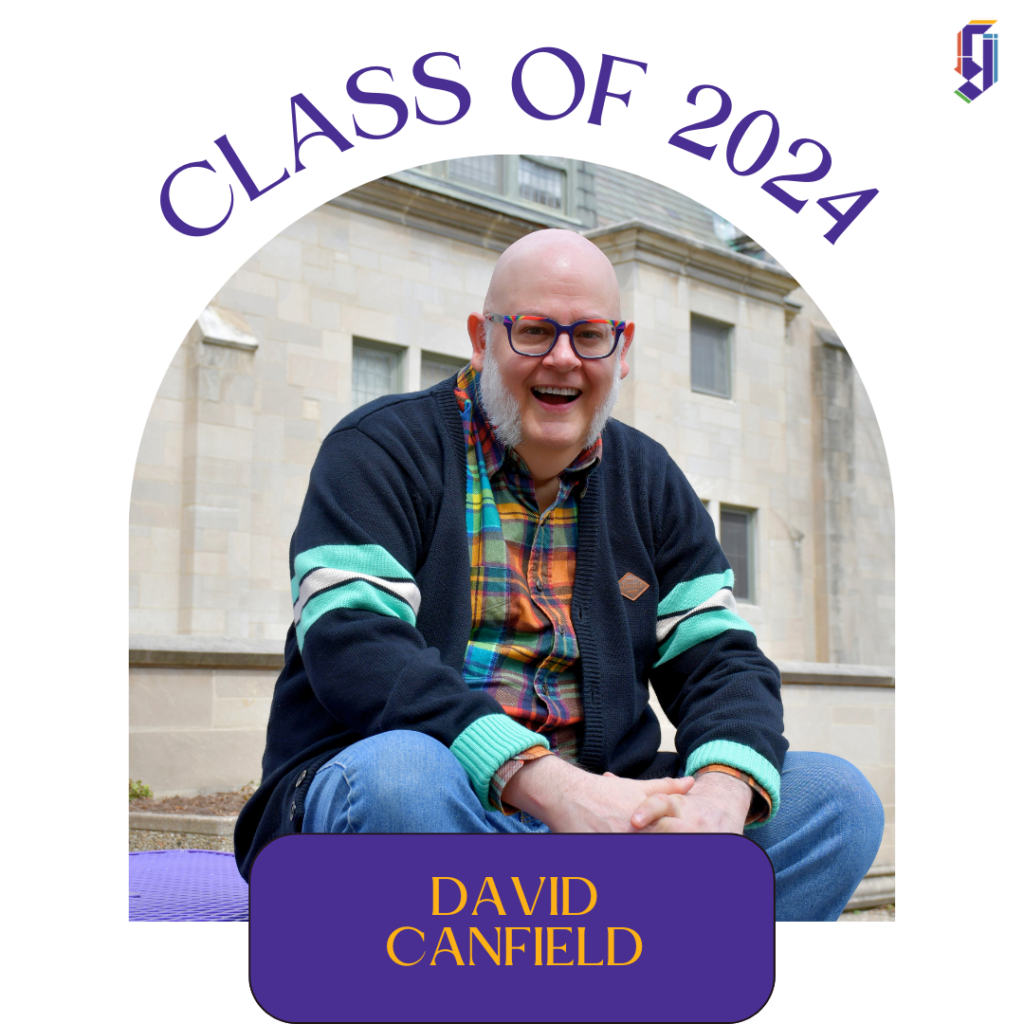The Creature Feature Preacher
May 15, 2024
An Interview with David Canfield ‘24

“The rhetoric of fear in moral panics never changes—no matter what they’re about, it is always the same.” Sitting across from David Canfield, he doesn’t immediately strike you as the likeliest candidate for scholarship about Satanic Panic and the culture wars that gripped 1980s America. He speaks with gregarious warmth and infectious laughter (in addition to being a sought-after expert for books and documentaries on the subject, he’s also stand-up comedian). However, that joviality is matched by equally shrewd perception about what manufactured crises reveal about white evangelical insecurities.
“Starting with the publication of Michelle Remembers up through the mid-1990s, you have this enormous subculture trying to scare the hell out of people,” he remembers. “Satan is just a figurehead for the invisible shadowy corners of that culture—when what folks were really afraid of was their neighbors.” The publication of books like The Late Great Planet Earth—which outsold every book other than The Bible in the 1970s—instilled eschatological panic as a defining feature of fundamentalist Christianity. “All of a sudden, you have people like Mike Warnke giving false testimony about being a Satanist high priest for a decade,” Canfield explains. “And they’re being treated like experts—no one is checking their stories but they’re live on 20/20.”
During the period, Canfield lived in a religious community working on Cornerstone magazine, which published the initial feature exposing Warnke as a fraud—describing how he invented this supposed life as a Satanic priest wholecloth to sell books and speaking appearances. The entire experience left a toll on Canfield’s perception of Christianity. “Eventually, I left the community and spent about 10 years decompressing from about 30 years of being involved full-time in religious life,” he says. “Then I decided to go back into full-time ministry, but seeing all this I needed new foundation, and I found that here at Garrett.” Perhaps fittingly for someone who spent so much time debunking religious phenomena with little basis in scripture, return to our faith’s core tenets provided a road back. “For me, there are three things that define Christianity,” he says. “The trinity, the incarnation, and the physical resurrection of Jesus. And I want people to know: God is not looking to ‘get you.’ You’re going to be okay.”
The simple love and promise of those claims stand in stark contrast to the wild excesses that defined the Satanic Panic. And yet, when it came time to write his Master’s thesis ahead of his impending graduation, he found his mind drawn back to the 1980s because of how it rhymes with our present. “The psychosocial anxieties of Evangelical Christianity are a fear of being replaced, a fear of being tainted, a fear of losing control of their children and their children’s future,” Canfield says. “Honestly they’re fears that they haven’t let Christianity address, so their faith has been left behind.” While the form that shadowy specter takes has now shifted, its essential nature remains unchanged. “If we think of today’s Q-Anon movement or Christian nationalism,” he offers. “We see this movement trying to cling to a past in which white evangelical power was centralized and unquestioned.”
Paradoxically, he sees potential in what he’s learned as a member of the horror and science fiction movie community to alleviate some of these existential anxieties. “I got the nickname ‘The Creature Feature Preacher’ because I helped create Screen Anarchy—the world’s largest website dedicated to weird little movies that fall through the cracks,” he laughs. “I’ve found ways to help people embrace ambiguity, to destigmatize theology as something that’s wrapped up in hard and fast rules and more as a way to talk to and engage with one another.” And there are blessings in the forms of that engagement he believes can benefit the wider church. “I discovered this amazing group of people who love and build community around these movies, who have abundant generosity and empathy for one another,” he says. “The acceptance they give the world has challenged me, because a central focus of Christianity is to take feelings of unworthiness off the table and clear a path for intimacy.”
Knitting together his scholarship on Satanic Panic, his stand-up comedy, his passion for horror movies, and his faith—this is the gift he hopes to share after graduation. “My thesis project is called Wouldst Thou Like to Live Deliciously? A Church Hungry for Monsters,” he chuckles. But tracing the rhetoric of fear brings him to focus on its opposite. “None of that matters,” he concludes. “When I die, all that matters will be, ‘Did people know that they were loved? Did they know that they were cared for?’ That’s what I hope to carry out of Garrett and model for the world.” Perhaps by studying monsters, he can help birth a world where we stop making them out of our neighbors.

